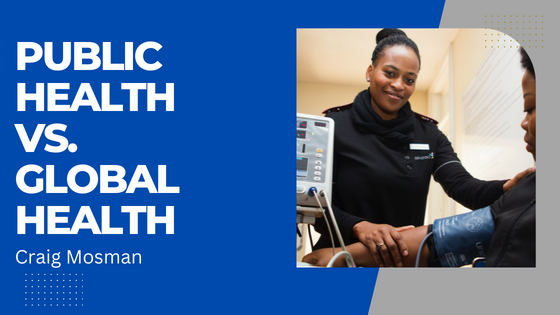The two branches of health professions, global and public health, have similar goals but diverge in their approaches and methodologies regarding treating and preventing diseases. Both of these employ individuals dedicated to improving their community’s quality of life.
Given the scale of health care, global and public health differences are understandable. While both branches of health professions focus on improving the quality of life in their communities, global health tends to focus on issues that affect the entire world.
Public Health
In 1933, Sir Donald Acheson, a physician and epidemiologist, defined public health as the science and art of preventing disease and promoting healthy lifestyles. He was also the former chief medical officer of the UK for a period of time during the 1900s.
Public health is focused on improving the quality of life in communities and individuals by reducing inequalities and strengthening health services. This goal is carried out through various forms of education and research. Besides conducting studies on diseases, public health practitioners also develop treatment programs and fight the spread of infectious diseases.
Public Health Challenges
The CDC is the federal agency responsible for fighting the spread of infectious diseases. In 2017, it identified several public health threats.
The CDC identified various global health threats that it considered severe in its annual report. Some of these included Ebola, yellow fever, and Zika.
The Zika virus is a highly dangerous disease that can cause birth defects and infant mortality. It can be transmitted to the fetus through an infected pregnant woman.
In 2016, the CDC reported that about one-third of antibiotic prescriptions were unnecessary. The agency has partnered with state health departments to address this issue by launching programs that provide treatment and screening for antibiotic resistance.
In response to the opioid epidemic, the CDC released new guidelines that encourage the use of opioids for treating chronic pain. Through its funding, state programs were also established to reduce the risk of overdose.
Global Health
Global health agencies are responsible for addressing various health issues that affect the entire world. One of the most prominent organizations in this field is the World Health Organization. Today, almost no country can be considered isolated. Due to the increasing number of people traveling worldwide, infectious disease threats have become more severe. Governments must take the necessary steps to protect their citizens.
Protecting The People
Through its global health diplomacy initiative, the WHO brings together various experts from different fields to address the threats of infectious diseases. They then work to develop a strategy to reduce the spread of these diseases.
The global health field is vital to the health of Americans. It plays a crucial role in identifying and controlling the spread of diseases, protecting the country’s citizens, and promoting international health.
The US has increased its global health budget by almost a hundred percent since 2006. It is committed to protecting its citizens and improving the health of developing nations.
This is very important for the country’s public health system. Besides improving the quality of its health, the US can also use other countries’ achievements as a starting point for developing effective programs and increasing its collaboration with other global health organizations.
Despite the increasing number of global health initiatives, the success of these programs is still only as strong as those carried out by individual countries. Due to rising globalization, the role of global health and public health professionals is becoming more critical. With that in mind, students should consider global health and public health when choosing their career path.

